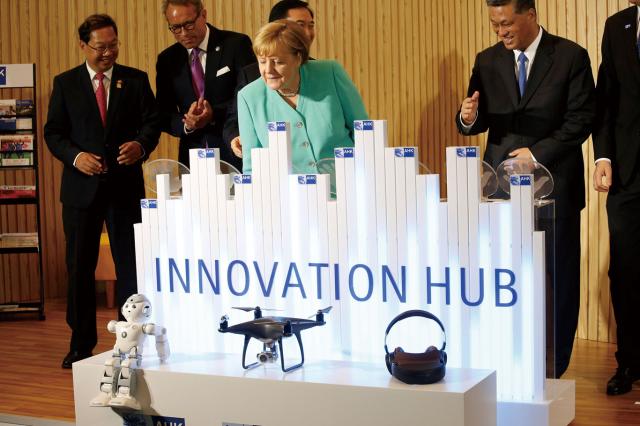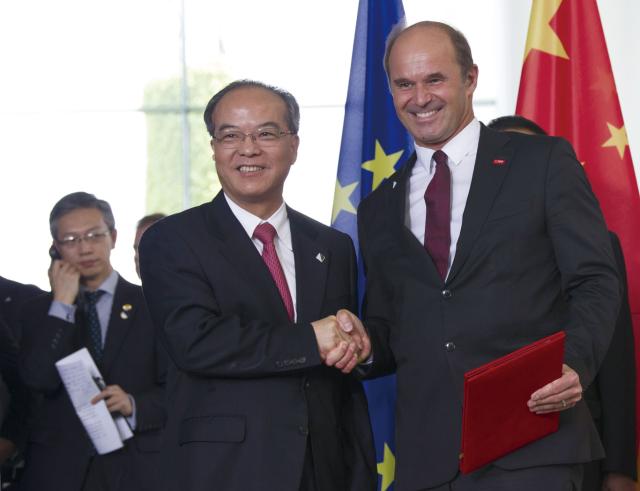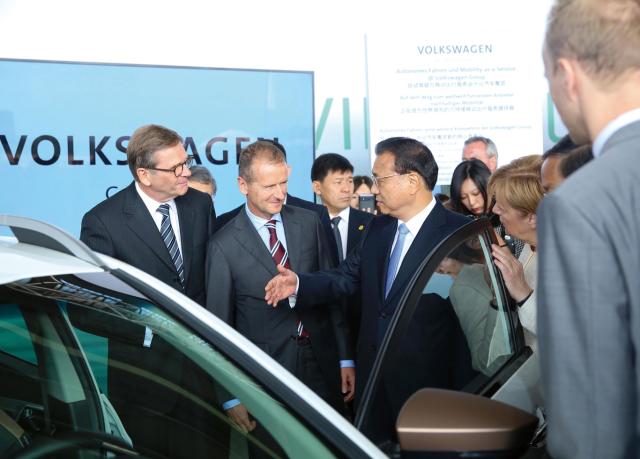It is somewhat ironic that the leader of the post-World War II international system of economic governance now wants to withdraw from the World Trade Organization (WTO),one of the structure’s three pillars. But US President Donald Trump has repeatedly bashed the organization and threatened to pull the US out during his election campaign. Indeed, US unilateralism and
protectionist rhetoric and actions on trade have triggered wide concern over the future of the multilateral trading system.
The US has imposed additional 25 percent tariffs on steel and 10 percent on aluminum imports from various nations, and is considering applying similar measures to imports of cars, trucks and auto parts. The main target is China. An additional US$250 billion worth of Chinese exports face extra tariffs of 10 or 25 percent if they want to access the US market. The value is more than the total trade between China and the US for the first five months of the year.
The US attacks have been strongly opposed by all its major trading partners, including close allies like the European Union, Canada and Japan. The widespread frustration is not only fueled by business losses that these economies and global growth will incur, but also the destruction of the world multilateral trading system. The actions of the Trump administration are largely based on US laws. The US declared that its national security was, or probably was, put at risk by foreign steel, aluminum and auto products. It complained that the WTO fails to address problems posed by an economy that is not market-oriented. With these claims, the US has circumvented the WTO dispute settlement mechanism.
Trading partners which are subject to the US tariff moves, including China, have responded with both retaliatory tariffs and WTO complaints. They expect that their WTO lawsuits will help not only defend their own interests, but also save a system that has contributed to peace and prosperity for more than 70 years. They are also trying to cooperate. As part of these efforts, China and its major trading partners, particularly the EU, are seeking closer ties.
The US investigations that have led to effective or pending tariff actions are based on two of its domestic laws. The one on steel, aluminum and auto products is called Section 232 of the Trade Expansion Act of 1962, as amended. According to the reports on steel and aluminum by the US Department of Commerce in January of this year, the section mandates the Commerce Secretary to investigate whether the quantities or circumstances of any imports “threaten to impair national security,” and requires the US president to decide whether to take action based on the findings and advice as a result of the investigation. The Department of Commerce determined in 2001 that both the defense of the US, and its “ability to project military capacities globally,” are included under “national defense,” which is defined by Congress as part of the concept of “national security.”
On July 12, the US Senate overwhelmingly passed a non-binding resolution to restrain Trump’s power to invoke Section 232. However, the move is intended to contain the abuse of presidential power that may hurt US business interests and allies. It does not indicate the retreat of unilateralism in trade.
The other law impacting China’s technology policies and practices is Section 301 of the US Trade Act of 1974, as amended, which authorizes the US Trade Representative to investigate and take action against anything deemed to be discriminatory or unfair to US companies. The article is highly controversial as foreign practices can be labeled “unreasonable,” even if they are “not necessarily in violation of, or inconsistent with, the international legal rights of the United States.”
In 1998, the EU, with 15 other economies as the third parties, including Japan, South Korea and Canada, filed a complaint against Section 301 at the WTO. The US won the lawsuit based on its
Uruguay Round Agreements Act Statement of Administrative Action passed by the US Congress in 1994. “That 1994 document expresses the long-held US intention to follow DSU (Dispute Settlement Understanding – a WTO agreement on rules and procedures of dispute settlement) procedures when making WTO-related determinations under Section 301,” said a press release from the US Trade Representative Office after the case was closed in January 2000. This means that the US has to get approval from the WTO before taking action against any other WTO member, according to Dharmendra N. Choudhary, a counsel at GDLSK LLP, a Washington-based trade law firm. He wrote in US magazine Global Trade that the section had remained almost dormant since the WTO set up its DSU in 1994, until it targeted China in 2010 by following WTO procedures. But the WTO was ignored in its recent action against China.
The WTO itself is at a crossroads. At a ministerial conference in Doha, Qatar in 2001, members canvassed revising the rules to facilitate trade and development. The aim was to address a range of issues to adapt to the economic situation in the new century, such as tariffs, investment, competition, market access and implementation. However, this Doha Round, also known as the Doha Development Agenda, remains in deadlock after years of negotiations mainly due to divisions on agricultural subsidies and tariffs.
The US has publicly expressed a lack of interest in the ongoing WTO negotiations and in the WTO itself. Right before the decision-making WTO ministerial meeting held in Kenya in 2015, US Trade Representative Michael Froman urged members to “free [the WTO] from the stricture of Doha” in an opinion piece for the Financial Times. When discussing the purpose of leading the Trans-Pacific Partnership, a 12-nation free trade block, then-US president Barack Obama repeatedly stressed that the US had to write the trade rules for the 21st century and could not let China do so.
In 2011 and 2016, the US blocked the reappointment of two members of the WTO Appellate Body, which hands down final rulings on disputes. Three out of the seven Members of the Appellate Body are chosen randomly to work as a Division for each case. Each Member can serve two four-year terms. Today there are only four Members in service, but the Trump administration has blocked the nomination of new Members. The Appellate Body has long been respected for its independence and expertise, and it is regarded as the most important and active operational part of the WTO, particularly in the context of the years of impasse following the Doha Round. The US’s actions have been criticized by other WTO member states and international law experts for impairing the independence of the Appellate Body and the multilateral trading system. At the release of its latest Annual Report on June 22, 2018,
Appellate Body Chairperson, Ujal Singh Bhatia, said the mechanism was facing “unprecedented challenges.” He warned that if the impasse continued it would further delay legal proceedings and could lead to fewer than three members on duty.
Intensive US unilateral trade attacks have aroused frustration among its major trading partners, who have retaliated with tariffs on US goods. Meanwhile, although the US has resorted to its domestic laws in the tariff measures, its trading partners have not given up on the multilateral mechanism. The EU, Canada, Mexico, Russia, Switzerland, Norway and China have filed complaints against the steel and aluminum tariffs with the WTO. China has filed separate complaints against the US tariffs on other Chinese goods.
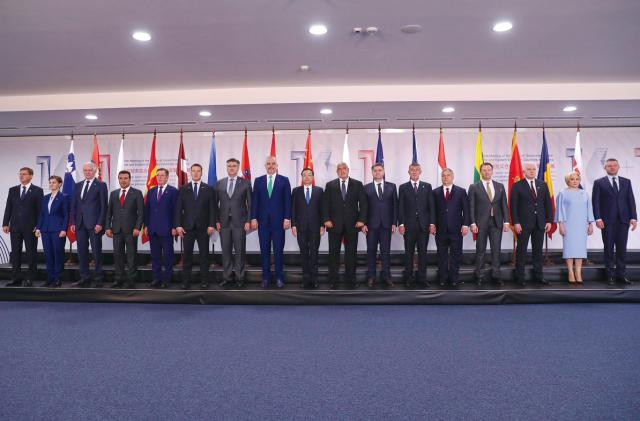
Chinese Premier Li Keqiang attends the 7th CEEC-China 16+1 Summit between China and Central and Eastern European nations, Sofia, Bulgaria, July 7,2018. Austria, Belarus, the European Union, Greece, Switzerland and the European Bank for Reconstruction and Development are present as observers
China shares common ground with its trading partners on defending the multilateral system. Trade ministers from BRICS – Brazil, Russia, India, China and South Africa – released a joint communiqué on the subject in South Africa. On June 30 and July 1, trade ministers of the Association of Southeast Asian Nations, China, Australia, New Zealand, India, Japan and South Korea stressed in Tokyo it was crucial to conclude their negotiations on Regional Comprehensive Economic Partnership “swiftly,” “particularly in view of the risk” of unilateralism.
The EU has been China’s largest trading partner for years. There is friction between them, but both have shown a willingness to solve this at the WTO and to cooperate in supporting the WTO’s central role in the international trading system. Besides, the EU has a more
positive attitude than the US to China’s reform progress. Cui Hongjian, director of European Studies at the China Institute of International Studies in Beijing, told NewsChina that common ground on defending multilateralism and free trade has brought the two sides closer recently.
The EU has implicitly opposed the US way of using Section 301 against China. When commenting on current trade frictions between China and the US, European Union Chamber of Commerce in China (EUCCC) president Mats Harborn has repeatedly stressed that the WTO, instead of unilateral tariff actions, should be the solution. He said at a press conference in Beijing on July 10 that it is necessary to fix the WTO, not abandon it. At several bilateral meetings in June and July, Chinese and European leaders reaffirmed their joint support for the WTO’s central role in the rule-based multilateral trading system and commitment to push forward reform of the WTO.
As a result of the 20th China-EU summit on July 16 in Beijing, the two sides elected to establish a vice-ministerial level joint working group on WTO reform. Before that, at the 5th China-German Intergovernmental Consultation on July 9 in Berlin, Chinese Premier Li Keqiang and German Chancellor Angela Merkel said they would push forward the nomination process for new members of the WTO Appellate Body. As Cui noted, the crisis that the WTO now faces also provides an opportunity for the reform of the organization and China-EU cooperation on this reform.
The two large trading partners have stepped up efforts to reach a bilateral investment agreement. They exchanged offers of market access during the summit. They regard the negotiations on the agreement as a “top priority,” and agreed to put the China-EU free trade agreement on the agenda based on the investment agreement. Chinese Premier Li Keqiang described the progress as an “action” that would send a message of upholding multilateralism and free trade.
A new EUCCC report released in Beijing looks into what China has done since Chinese President Xi Jinping told the world of his commitment to economic globalization in a speech at the World
Economic Forum in Davos, Switzerland, in January 2017. The report, titled 18 Months Since Davos: How China’s Vision Became A Reform Imperative, notes the “pace of reform has been much quicker in the last 18 months relative to any other period since China’s accession to the WTO in 2001.”
Harborn told NewsChina that business should not be mixed up with politics. Cui said this idea was still the mainstream in the EU. However, Cui also warned that the politicization of economic issues with China was rising in the EU. He offered two conditions for the success of China-EU cooperation. First, both must resist the unilateral actions of the US. Secondly, they must set a good example for other WTO members by solving trade disputes between them properly. The EUCCC report expresses dissatisfaction toward China’s market access and regulatory framework. China has also been unhappy with the EU’s recent trade investigations against some Chinese products. Political will is necessary to defend economic interests. It cannot be used to narrowly define economic interests that can be, and should be beneficial to all.
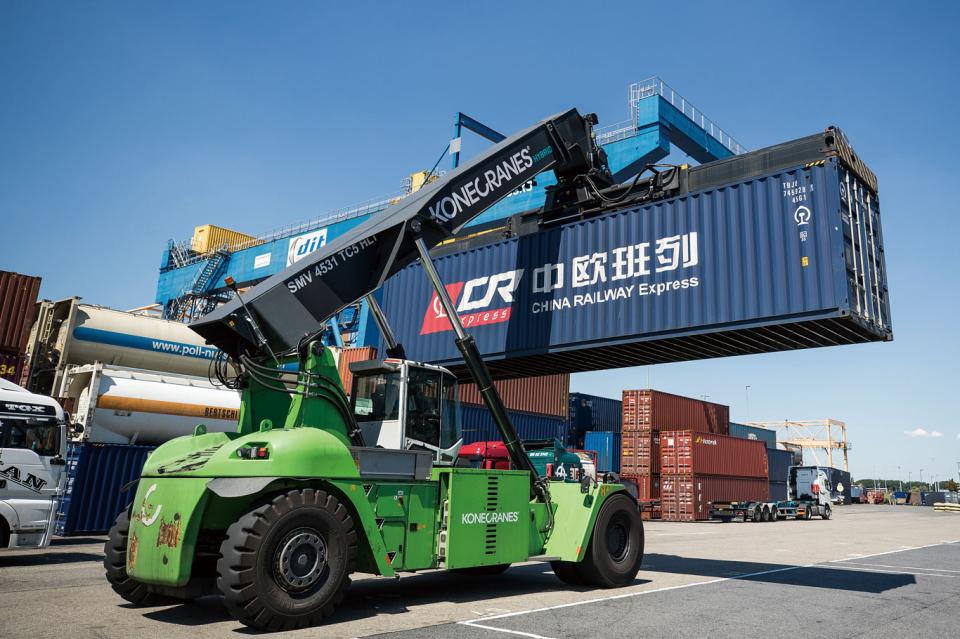
 Old Version
Old Version
